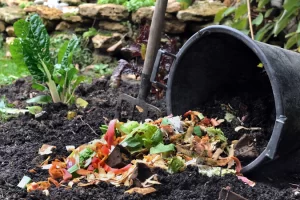As governments face the challenge of reducing the amount of organic waste going into landfills. Landfills are expensive to operate and maintain, and they can also be harmful to the environment. That’s why it’s important to reduce the amount of waste we produce. Composting is an eco-friendly process that transforms organic waste into nutrient-rich material. It helps to reduce the amount of waste that goes to landfills, and it also creates a valuable resource for gardening and agriculture.
According to the Environmental Protection Agency (EPA), a staggering 30% of what ends up in landfills consists of food scraps and yard waste.
Composting is not merely a trend but a scientifically proven method to reduce our carbon footprint. In a groundbreaking study published in the Journal of Applied Microbiology, it was found that proper aeration, a key aspect of composting, can accelerate the decomposition process by a remarkable 75%. This statistic underscores the importance of adopting effective composting techniques for both environmental and efficiency reasons.
In this article, we will provide the important tips and tricks for effective composting.
1. Choose Best Compost Pile
Selecting the right compost bin is the first step to successful composting. Compost bins come in various shapes and sizes, so choose one that suits your needs.
- Rotating Compost Tumblers: These are ideal for quick and efficient composting. The rotating mechanism ensures proper aeration, speeding up the decomposition process.
- Dual Chamber Composters: These allow you to add waste to one chamber while the other chamber matures into ready-to-use compost. Perfect for continuous composting!
- Size Matters: Choose a compost bin size based on the amount of waste you generate. Smaller bins work well for urban spaces, while larger ones are great for gardens.
2. Add Greens & Browns in Right Ratio
A balanced mix of greens (nitrogen-rich materials) and browns (carbon-rich materials) is essential for effective composting.
- Greens: Fruit and vegetable peels, coffee grounds, tea dust, and fresh garden waste.
- Browns: Dried leaves, sawdust, shredded paper, and eggshells.
- Ideal Ratio: Maintain a carbon-to-nitrogen ratio of 25-30:1 for optimal decomposition.
3. Add Water and Air
Composting requires the right balance of moisture and oxygen.
- Water: Add just enough water to keep the compost moist but not soggy. Think of a wrung-out sponge!
- Air: Regularly turn or rotate your compost pile to aerate it. Studies show that proper aeration can speed up decomposition by 75%.
4. Consider Design to Hold More Heat
Heat is a byproduct of microbial activity and is crucial for breaking down organic matter.
- Insulated Compost Bins: These maintain high internal temperatures (up to 160°F), promoting faster decomposition.
- Microbial Activity: The heat generated by microorganisms ensures efficient composting, regardless of external weather conditions.
5. Choose Rodent & Odor Eliminating Pile
Nobody wants a smelly or pest-infested compost pile. Here’s how to avoid it:
- Ventilation: Use a compost bin with proper airflow to control odors.
- Balanced Ingredients: Maintain the right mix of greens and browns to minimize bad smells.
- Avoid Certain Items: Do not add meat, dairy, or oily foods, as they can attract rodents and create unpleasant odors.
- Regular Turning: Turn your compost regularly to speed up decomposition and disperse odors.
- Rodent-Proof Design: Choose a compost bin with a secure lid and raised base to keep pests out.
What can Compost?
- Food Scraps
- Bones
- Egg Shells
- Fruit and Vegetables
- Guinea pig cages
- Coffee and Tea Dust
- Soft Plant Waste
- Bread & Biscuits
- Shellfish
- Wood Pellet
- Paper(torn up into small pieces)
What can’t compost?
- Vacuum cleaner bags
- Cigarette butts and cigarette ashes
- Hard, woody plant stems (even if shredded)
- Milk or juice cartons, cling film
- Rubber and plastic items
- Chewing gum
- Tinfoil and other metals
- Disposable nappies/diapers
- Sawdust from treated wood
- Non wood-pallet based cat titer
- Liquids – milk soup etc.
Final Thoughts
Composting is a simple yet powerful way to reduce waste and create nutrient-rich fertilizer for your garden. Nearly 40% of residential waste is compostable, and using homemade compost can reduce the need for chemical fertilizers by 80%.
By composting, you’re not just reducing waste—you’re contributing to a healthier environment for future generations.
Start Your Composting Journey Today!
If you’re ready to embrace composting, explore our composting supplies. Our dual-chamber compost bins, have everything you need to get started. Visit our product page to find the perfect composting solution for your needs.

